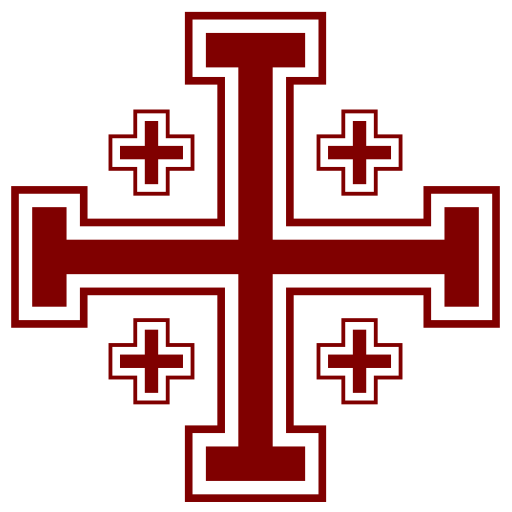Stand up for the facts!
Our only agenda is to publish the truth so you can be an informed participant in democracy.
We need your help.
I would like to contribute

Pete Hegseth walks to an elevator for a meeting with President-elect Donald Trump at Trump Tower in New York, Dec. 15, 2016. (AP)
If Your Time is short
-
President-elect Donald Trump’s defense secretary pick, Pete Hegseth, is a former Fox News host and military veteran. He has tattoos of the Jerusalem cross and the Latin phrase “Deus Vult,” which means “God wills it.”
-
Hegseth has said he was barred from serving among the 25,000 National Guard members during President Joe Biden’s January 2021 inauguration because of his cross tattoo. The Associated Press reported that another guard member flagged Hegseth’s “Deus Vult” tattoo as a possible “insider threat” because of its association with supremacist groups.
-
Christianity experts told PolitiFact that the Jerusalem cross and the “Deus Vult” phrase date to the Crusades and now are often connected to extremist groups.
President-elect Donald Trump’s defense secretary pick, Pete Hegseth, a former Fox News host and military veteran, has faced allegations of sexual assault and questions about his tattoos and their possible connection to extremist groups.
Readers asked PolitiFact whether Hegseth’s tattoos barred him from serving in the National Guard during President Joe Biden’s January 2021 inauguration. Hegseth has multiple tattoos, and two are of an image and a phrase often associated with extremist groups: a chest tattoo of the Jerusalem cross and an arm tattoo of the Latin phrase, "Deus Vult," which means "God wills it."
Hegseth has said in multiple interviews this year that his National Guard service orders were revoked before Biden’s inauguration because of his Jerusalem cross tattoo, which he described as "a Christian symbol." Hegseth did not mention the "Deus Vult" tattoo in these interviews.
The "Deus Vult" tattoo caused another National Guard member to flag him as a possible "insider threat" before the inauguration because of the phrase’s association with "supremacist groups," The Associated Press reported.
PolitiFact asked the National Guard whether Hegseth was blocked from serving during Biden’s inauguration because of his tattoos, but the guard declined to comment. We also contacted Hegseth’s former employer, Fox News, but did not receive a reply before publication.
When asked for comment on Hegseth’s tattoos being associated with extremist groups, Steven Cheung, a Trump transition team spokesperson, said, "Pete Hegseth dedicated his entire life as a warrior for the troops and for our country. … With Pete as our Secretary of Defense, America’s enemies are on notice and our military will be great again."
Hegseth pushed back on reporting about his tattoos’ association with extremist groups. "They can target me — I don’t give a damn — but this type of targeting of Christians, conservatives, patriots and everyday Americans will stop on DAY ONE at (Trump’s) DoD," he wrote Nov. 15 on X, using shorthand for the Defense Department.
Hegseth has denied the sexual assault allegation. His attorney told CBS News that Hegseth settled with his accuser to avoid being fired by Fox News over the allegation. Hegseth has said the encounter was consensual.
Christianity and religious history experts told PolitiFact the Jerusalem cross and the phrase "Deus Vult" are rooted in the Crusades, which were a series of religious wars between Christians and Muslims. The symbols have modern-day ties to far-right and white supremacist groups.
The meaning of the Jerusalem cross and "Deus Vult"
Both the Jerusalem cross and the phrase "Deus Vult" date to the 11th century when the Crusades began, experts said. The Catholic church in Europe organized violent military expeditions to retake control of the Holy Land from Muslims.
Matthew Taylor, senior scholar at the Institute for Islamic, Christian and Jewish Studies who specializes in Christian extremism, said that according to legends, in response to Pope Urban II’s speech calling for the First Crusade in 1095, the crowd chanted "Deus Vult," or "God wills it," and that became the Crusades’ motto.
The idea of the chant was that "not only should Christians go and take back, especially Jerusalem, but really the entirety of the lands that Jesus lived in as rightly Christian property, but that it is God’s will. It is God’s mandate. That there is a divine mandate for this violence, especially against Muslims," Taylor said.

Graphic of Jerusalem Cross (Wikimedia)
One of the symbols Crusaders wore was the Jerusalem cross, also known as the crusader cross, experts said.
Today, the Jerusalem cross isn’t a common Christian symbol, nor is the phrase "Deus Vult," said Matthew Gabriele, a Virginia Tech medieval studies professor. Some small sects of mainstream religions, such as the Catholic Order of the Holy Sepulchre, use the Jerusalem cross.
However, both the cross and the Latin phrase "Deus Vult" are popular among right-wing extremist groups, experts said. Flags bearing the crusader cross and "Deus Vult" were flown during a 2017 white supremacist rally in Charlottesville, Virginia. The phrase "Deus Vult" was also on flags at the Jan. 6, 2021, attack on the U.S. Capitol. A gunman who killed eight people in 2023 in Allen, Texas, had swastika and "Deus Vult" tattoos.
Although the Jerusalem cross "doesn’t always necessarily connote an endorsement of the Crusades," Taylor said, far-right and neo-Nazi groups use the symbol. "‘Deus Vult’ is even more prominently embraced (by extremist groups) as a very aggressive vision of Christian conquest," he said.
When used in combination, the Jerusalem cross and "Deus Vult" are "an invocation of the claim that crusader violence and its atrocities (including the massacre of civilians) was legitimate," said Tom Hill, president and executive director of the Center for Peace Diplomacy, a nonpartisan organization working to end and prevent wars.
"It is this bloody, militant intent that comes first when seeking to understand its current usage as a symbol for those pledging their allegiances in contemporary politics — and this is why it has been appropriated by the so-called ‘alt right,’" Hill said.
Hegseth’s comments about being barred from Biden’s inauguration
Hegseth joined the U.S. Army Reserves in May 2001. About a year later, he joined the National Guard, serving in New Jersey, New York, Minnesota, Massachusetts and the District of Columbia. He was deployed to Guantanamo Bay in Cuba, Iraq and Afghanistan and earned two Bronze Stars and a combat infantry badge. When Hegseth retired in March 2021, he held the rank of major, the National Guard said.
Following the Jan. 6, 2021, riot at the U.S. Capitol, there was heightened security for Biden’s inauguration two weeks later.
Hegseth said in a Nov. 7 "Shawn Ryan Show" podcast interview that initially he was among the 25,000 National Guard members called to serve in Washington, D.C., for the inauguration. But a day before the event, Hegseth said, his commanding officer called him to say he was no longer needed.
"I was deemed an extremist because of a tattoo by my National Guard unit in Washington, D.C., and my orders were revoked to guard the Biden inauguration," Hegseth said on the podcast, adding that he decided to retire from the guard after this.
Hegseth said the tattoo that "got me disinvited" was the one on his chest of the Jerusalem cross, which looks like a large cross with four smaller crosses, one in each corner.
"It’s a Christian symbol. That’s all it is," Hegseth said.
Another member of the District of Columbia National Guard who in January 2021 was managing security and working on an anti-terrorism team raised concerns about another of Hegseth’s tattoos.
Retired Master Sgt. DeRicko Gaither shared an email with the AP that he sent Jan. 14, 2021. He wrote that Hegseth’s "Deus Vult" tattoo is "associated with supremacist groups." Gaither also wrote that the tattoo violates the Army’s rule prohibiting tattoos anywhere on the body with extremist words or images.
"Sir, with the information provided this falls along the line of Insider Threat and this is what we as members of the U.S. Army, District of Columbia National Guard and the Anti-Terrorism/Force Protection Team strive to prevent," Gaither wrote.
After vetting from the FBI, 12 National Guard members were removed from duty for Biden’s inauguration because of extremist statements or ties to right-wing extremist groups, the AP reported in January 2021. It’s unclear whether Hegseth was among this group.
CORRECTION, Nov. 20, 2024: The story was updated to clarify uses of the Jerusalem Cross symbol and the phrase "Deus Vult."
CORRECTION, Nov. 25, 2024: The story was updated to note that Hegseth is a former Fox News host.
Our Sources
Phone interview with Matthew Taylor, senior scholar at the Institute for Islamic, Christian and Jewish Studies specializing in Christian extremism, Nov. 18, 2024
Phone interview with Julie Ingersoll, religious studies professor at the University of North Florida, Nov. 18, 2024
Email interview with Matthew Gabriele, a medieval studies professor at Virginia Tech, Nov. 15, 2024
Email interview with Tom Hill, president and executive director of the Center for Peace Diplomacy, Nov. 18, 2024
Email exchange with Andrea Tsuchiya, spokesperson for the Minnesota National Guard, Nov. 18, 2024
Email statement from Steven Cheung, spokesperson for President-elect Donald Trump’s transition team, Nov. 18, 2024
Pete Hegseth, Instagram post (archived version), Aug. 21, 2023
Pete Hegseth, Instagram post (archived version), Sept. 8, 2020
Pete Hegseth, Instagram post (archived version), May 19, 2020
Pete Hegseth, X post (archived version), Nov. 15, 2024
YouTube, "Shawn Ryan Show - Pete Hegseth - Secretary of Defense Nominee | SRS #143," Nov. 7, 2024
YouTube, "Hugh Hewitt - From the Archives: Hugh interviews Pete Hegseth about 'The War on Warriors'," Nov. 13, 2024
Fox News, "'The War on Warriors': Pete Hegseth shares shocking never-before-told Biden inauguration story in new book," June 4, 2024
The Associated Press, "Pete Hegseth had been flagged by service member as possible 'Insider Threat'," Nov. 15, 2024
The Associated Press, "2 Guard members made extremist statements about inauguration," Jan. 19, 2021
U.S. Army, "Army eases tattoo restrictions with new policy," June 23, 2022
Modern Medieval, "A Wannabe "Crusader" in the Trump Cabinet," Nov. 15, 2024
Historians.org, "After Charlottesville," Jan. 2, 2019
Uncivil Religion, "The Deus Vult Cross," accessed Nov. 18, 2024
Anti-Defamation League, "Allen Gunman’s Writings Reveal a Disturbed, Hateful Man—But No Clear Motive," May 10, 2023
The Washington Post, "Donald Trump Jr.’s ‘crusader’ rifle shows how obsessed the right is with the Middle Ages," Jan. 7, 2020
































